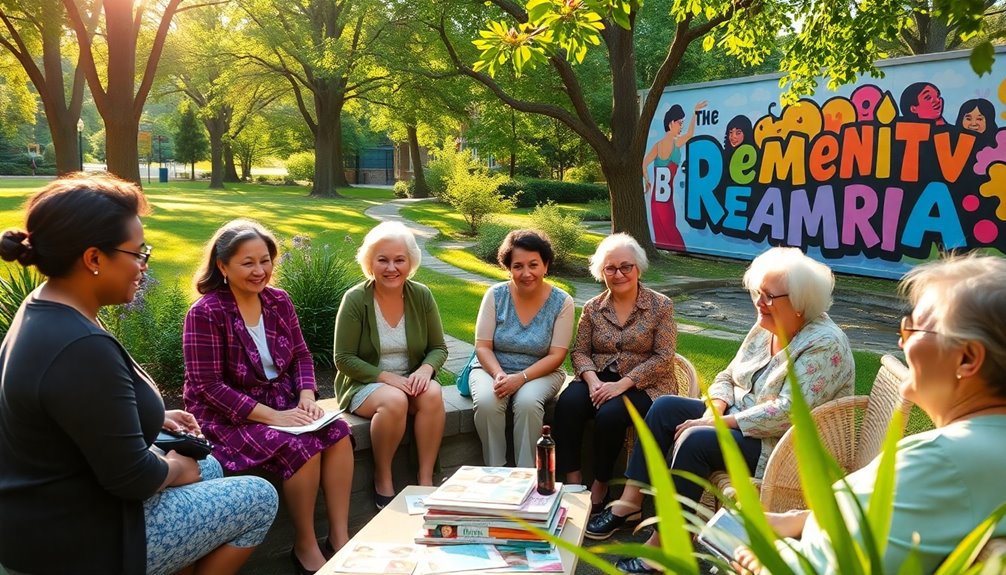Discovering caregiving resources can truly transform your experience. Start by joining caregiver support groups for shared experiences and coping strategies. Explore Memory Cafés for social engagement and support. Utilize the Alzheimer's Association Helpline for immediate assistance or access Family Caregiver Alliance resources for education and tools. Engage with the Alzheimer's Foundation of America for valuable webinars and care guides. Don't miss out on leveraging Cleveland Clinic resources or tapping into assistance from the U.S. Department of Veterans Affairs. There's so much more to explore!
Key Takeaways
- Join caregiver support groups for shared experiences and coping strategies, improving your mental health and reducing stress.
- Utilize 24/7 helplines like the Alzheimer's Association for immediate emotional support and guidance tailored to your caregiving challenges.
- Engage in Memory Cafés to foster social connections and reduce isolation while enjoying activities that promote cognitive stimulation.
- Access educational materials and webinars from organizations like the Caregiver Action Network to enhance your caregiving knowledge and skills.
- Explore specialized support programs for veterans through the U.S. Department of Veterans Affairs for tailored healthcare and caregiver resources.
Understanding Caregiver Support Groups

While caregiving can often feel isolating, joining a caregiver support group can provide an essential lifeline.
These groups create a safe space for you to share your experiences, challenges, and coping strategies with others who understand what you're going through. You'll find emotional support that's hard to come by elsewhere, helping you feel less alone in your journey.
Many support groups are facilitated by professionals who offer valuable guidance and resources to help you navigate your caregiving role. Research shows that participation in these groups can lead to improved mental health, empowering you and reducing stress.
Organizations like the Alzheimer's Association and Family Caregiver Alliance provide access to both in-person and online support groups, making it easier than ever to connect.
Exploring Memory Cafés

Memory Cafés offer a unique chance for you and your loved one to engage socially while enjoying various activities like music and art.
These gatherings create a supportive community where you can connect with others facing similar challenges.
Social Engagement Opportunities
If you're looking for a welcoming space to connect with others facing the challenges of dementia, consider attending a memory café.
These gatherings offer caregivers and individuals with dementia a chance to engage in social activities while fostering a sense of community.
Here are four benefits of participating in memory cafés:
- Emotional Support: Share experiences with others who understand your journey.
- Cognitive Stimulation: Enjoy activities like music, arts, and games to enhance mental engagement.
- Improved Communication: Build skills by interacting in a supportive environment.
- Reduced Isolation: Combat feelings of loneliness through connection and shared experiences.
Activities and Workshops
Engaging in activities and workshops at a memory café can be a rewarding experience for both caregivers and individuals with dementia. These gatherings offer structured activities that stimulate cognitive function and enhance mood, providing essential support for you and your loved one. You'll meet others facing similar challenges, reducing feelings of isolation. Furthermore, participating in these activities can improve emotional well-being and enrich your caregiving experience. The power of visualization techniques can play a crucial role in enhancing the effectiveness of these activities, helping both caregivers and individuals with dementia to align with positive experiences.
| Activity | Benefits | Frequency |
|---|---|---|
| Music Therapy | Boosts mood and memory | Weekly |
| Art Projects | Encourages creativity | Bi-weekly |
| Reminiscence Sessions | Promotes connection | Monthly |
| Games and Puzzles | Enhances cognitive skills | Weekly |
| Social Discussions | Fosters community support | Monthly |
Participating in these activities can improve well-being and enrich your caregiving experience.
Supportive Community Environment
Finding a supportive community can make a significant difference in your caregiving journey.
Memory Cafés offer a welcoming space for individuals living with dementia and their caregivers, fostering connections and engagement. These cafés provide essential caregiving resources and create a supportive environment that benefits everyone involved.
Here are four reasons to contemplate joining a Memory Café:
- Social Interaction: Meet other caregivers and share experiences.
- Engaging Activities: Participate in music, art, and reminiscing sessions that stimulate cognitive function.
- Emotional Support: Alleviate feelings of isolation through community connection.
- Accessibility: Many cafés are hosted by local organizations and offer low-cost or free participation.
Additionally, participating in these cafés can enhance socialization opportunities that are crucial for both caregivers and those they support.
Utilizing the Alzheimer's Association Helpline

When you're facing the challenges of dementia care, the Alzheimer's Association Helpline is available 24/7 to offer the support you need.
You can call 1-800-272-3900 for immediate assistance, whether you need crisis resources or just someone to talk to.
This helpline connects you with trained professionals who understand what you're going through and can help guide you through tough moments.
24/7 Support Availability
How can caregivers find immediate support during challenging moments? The Alzheimer's Association Helpline is an essential resource available 24/7 for family caregivers facing crises or needing guidance on caregiving duties.
You can call 1-800-272-3900 to connect with trained professionals who understand your unique situation.
Here's what you can gain from the helpline:
- Personalized advice tailored to your needs.
- Access to a wealth of educational materials on dementia care.
- Assistance in maneuvering local services and support networks.
- Emotional support to reduce feelings of isolation and stress.
Utilizing this helpline can transform your caregiving experience, providing you with the resources and reassurance necessary to traverse this challenging journey.
Crisis Assistance Resources
What do you do in a crisis as a caregiver? You can turn to the Alzheimer's Association Helpline for immediate crisis assistance. Available 24/7, this helpline connects you with experts who provide guidance on managing challenging behaviors and understanding disease progression.
It's not just about practical advice; you'll also find emotional support. Sharing your experiences with trained professionals who understand your caregiving role can be incredibly validating.
Plus, you can get help with legal and financial issues related to dementia care, including navigating through insurance benefits. The helpline also offers online resources and downloadable materials, enhancing your understanding and management of dementia care.
Don't hesitate to reach out when you need support.
Accessing Family Caregiver Alliance Resources

Accessing the resources offered by the Family Caregiver Alliance can greatly enhance your caregiving journey.
As a family caregiver, you'll find invaluable support that makes managing your caregiving responsibilities easier. Here are some key resources to explore:
- Educational Materials: Access a library of articles and guides on coping strategies and understanding dementia.
- Online Support Groups: Join virtual support groups to connect with others facing similar challenges.
- Family Caregiver Toolbox: Utilize practical tools and tips designed to enhance your well-being.
- Advocacy Efforts: Learn about initiatives aimed at improving caregiver support at various levels.
Engaging With the Alzheimer's Foundation of America

Engaging with the Alzheimer's Foundation of America (AFA) can greatly bolster your caregiving efforts, especially when facing the challenges of Alzheimer's disease.
The AFA offers a free 24/7 helpline, providing immediate help and resources for you and your loved ones. Their webinars and educational programs enhance your knowledge, equipping you with essential skills for effective caregiving.
Access to memory screening programs allows for early detection of cognitive impairments, ensuring timely intervention. You can also download care guides and tip sheets that simplify daily challenges associated with dementia care.
Plus, AFA's Memory Cafés foster social connections, creating a supportive community for both caregivers and individuals with dementia.
Engaging with AFA can transform your caregiving journey.
Connecting With the National Alliance for Caregiving

Connecting with the National Alliance for Caregiving (NAC) can greatly enhance your experience as a caregiver. This non-profit organization is dedicated to improving the quality of life for family caregivers through advocacy and education.
By engaging with NAC, you gain access to crucial resources that can support your caregiving journey. Here are some key benefits:
- Research Insights: Stay informed with thorough studies on caregiving trends.
- Advocacy Tools: Learn how to advocate for your needs and those of your loved ones. Engaging with digital literacy programs can also bolster your communication skills. Understanding filial responsibility laws can help you navigate financial obligations related to elder care.
- Health Care Collaboration: Connect with healthcare providers and community organizations.
- Essential Guides: Utilize resources like the "Brain Health Conversation Guide" for meaningful discussions.
Additionally, NAC can provide information on financial considerations for elderly care, which is essential for planning and managing caregiving expenses.
Embrace these Family Caregiving Resources and empower your caregiving experience!
Leveraging Cleveland Clinic Resources

When you're maneuvering through the challenges of caregiving, leveraging the resources offered by the Cleveland Clinic can make a significant difference in your journey.
They provide interactive brain health assessment tools that help you evaluate cognitive health and track changes over time. With access to dementia prevention strategies, you'll find evidence-based practices to support your loved one's cognitive well-being.
The educational materials cover various topics related to dementia care, enhancing your knowledge and skills for daily challenges. Additionally, Cleveland Clinic offers information on support services available for caregivers, making it easier for you to navigate caregiving complexities.
Seeking Assistance From the U.S. Department of Veterans Affairs

If you're a veteran or caregiver, the U.S. Department of Veterans Affairs offers valuable resources to support you.
From healthcare services to financial assistance programs, you can access a range of services tailored to your needs.
Don't hesitate to reach out for caregiver support, where you can find training and emotional guidance at any time.
Veterans' Healthcare Services
How can you guarantee that the veterans in your life receive the healthcare they deserve? The U.S. Department of Veterans Affairs (VA) offers extensive healthcare services tailored specifically for them.
Here's how you can access these essential resources:
- Primary & Specialty Care: Make certain they receive the medical attention they need.
- Mental Health Services: Access support for emotional well-being and cognitive impairments.
- Long-term Care Support: Find options for ongoing care that fits their needs.
- Caregiver Support Programs: Utilize resources, training, and respite care options designed for family caregivers.
Don't forget to reach out to the VA's Caregiver Support Line, available 24/7, to connect with helpful resources and gain guidance in steering through their benefits.
Financial Assistance Programs
Maneuvering the financial landscape of caregiving can be challenging, but the U.S. Department of Veterans Affairs (VA) offers valuable financial assistance programs that can ease your burden.
You might qualify for VA financial assistance through benefits like Aid and Attendance, which helps offset costs related to in-home care or assisted living. The VA Pension program provides monthly support for eligible wartime veterans and their surviving spouses, offering essential relief.
Additionally, the caregiver support program supplies resources, education, and financial aid for family caregivers, including training and respite care. These programs can also cover medical expenses, home modifications, and transportation costs.
Be sure to check eligibility criteria via the VA's website or local VA offices for personalized guidance.
Caregiver Support Resources
As a caregiver for a veteran, you have access to a range of invaluable support resources offered by the U.S. Department of Veterans Affairs.
These resources can greatly ease your caregiving journey. Here are four key support options:
- Caregiver Support Line: Reach out 24/7 for assistance tailored to your unique challenges.
- Caregiver Support Program: Benefit from training, peer support groups, and potential financial assistance.
- Respite Care Programs: Take a break while ensuring your loved one receives quality care.
- Community Collaborations: Connect with local organizations that enhance your support network.
Utilizing these resources can help you manage the demands of caregiving while ensuring the veteran in your care receives the support they need.
Tapping Into the Caregiver Action Network

When you're steering through the challenges of caregiving, tapping into the resources offered by the Caregiver Action Network (CAN) can make a significant difference. This non-profit organization is dedicated to supporting family caregivers like you by providing practical resources and education.
The Family Caregiver Toolbox is a great starting point, packed with tools and tips to help you manage your responsibilities effectively. Additionally, CAN offers educational webinars covering essential topics such as managing stress and understanding dementia.
You can also connect with other caregivers through their community forum, sharing stories and advice with those who truly understand your journey. CAN's advocacy efforts further aim to raise awareness of family caregiver issues, ensuring your needs are recognized. For example, learning about developing a strong support network can help caregivers find the emotional support they need.
Discovering Dementia Friendly America Initiatives

To create a more supportive environment for individuals with dementia and their caregivers, communities are increasingly embracing the Dementia Friendly America (DFA) initiative. This national effort helps make communities more dementia-friendly by providing essential resources and training.
Here are four key aspects of the DFA initiative:
- Toolkits and Guidelines: Access resources that guide communities in becoming dementia-friendly.
- Training Programs: Local businesses and organizations learn to effectively interact with individuals with dementia.
- Community Events: Engage people with dementia to reduce social isolation and enhance their quality of life.
- Sustainable Practices: Implement best practices to create lasting, supportive environments for caregivers and individuals affected by dementia.
Joining DFA means transforming your community into a caring, understanding space for everyone.
Frequently Asked Questions
What Resources Do Caregivers Need Most?
As a caregiver, you need resources that support both your emotional and physical well-being.
Joining support groups can connect you with others who share similar experiences, while nutrition resources help you prioritize your health.
Effective communication techniques are essential for easing tension during interactions.
Additionally, creating a structured care plan can reduce confusion.
Finally, don't underestimate the importance of respite care services; they give you necessary breaks to recharge and prevent burnout.
What Is the Most Important Thing for Caregiving?
You might think caregiving is all about the person you're caring for, but the most important thing is actually prioritizing your own self-care.
If you don't take care of yourself, you risk burnout and stress, which can harm both you and your loved one.
Make time for your health, seek help, and establish a strong support network.
What Are Caregivers Not Allowed to Do?
As a caregiver, there are several important limitations you need to be aware of.
You can't make medical decisions without proper legal authority, like a power of attorney.
You also can't restrain or confine someone without consent, as that could be considered abuse.
Managing finances is off-limits unless you've been legally designated to do so.
Most importantly, don't neglect your well-being; prioritizing self-care is essential for providing quality care.
Which of the Following Is Important to Promote and Maintain the Caregiver's Health?
To promote and maintain your health as a caregiver, prioritize self-care.
Make time for regular breaks to recharge and reduce fatigue. Incorporate brain-healthy foods, like berries, into your diet to boost your cognitive function.
Join support groups or seek professional help for emotional relief and coping strategies. Establish daily routines and engage in enjoyable activities to enhance your physical and mental well-being.
Conclusion
You might think you don't have time to explore these caregiving resources, but investing just a little time can make a huge difference in your life. Each resource is designed to offer support, guidance, and community, helping you navigate the challenges of caregiving more effectively. By reaching out and utilizing these tools, you'll not only lighten your load but also enhance your well-being. Don't hesitate—take that first step towards a more manageable and fulfilling caregiving journey today!









